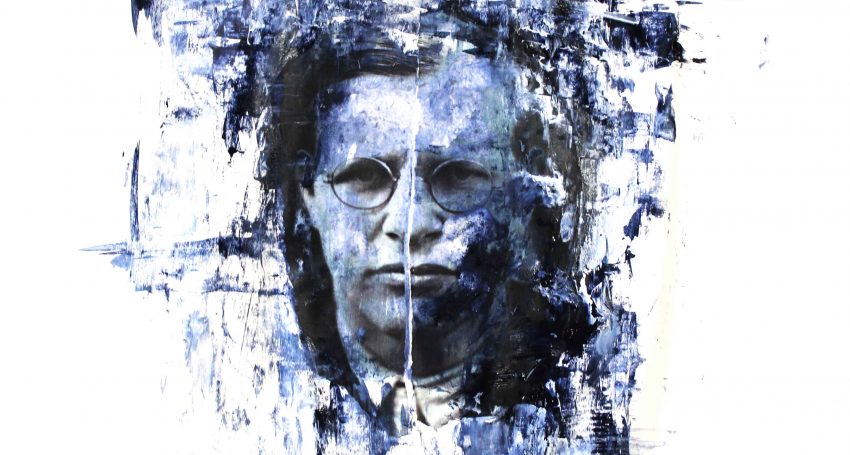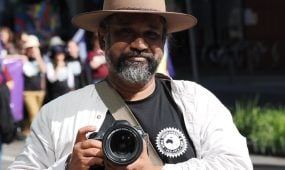Dietrich Bonhoeffer: faith as unsovereign attention
Features
Dr Peter Kline reflects on the legacy of theologian and anti-Nazi dissident, Dietrich Bonhoeffer, whose anniversary of death is marked on 9 April and who spent time in a Black church in New York City: “What Bonhoeffer found in the Black church was a faith in which Jesus, and therefore God, is Black…It is to say that God is to be found in solidarity with Black lives in their fight against white supremacy”

Story Timeline
Saints and martyrs
- Anselm of Canterbury
- ‘Utterly orthodox and utterly radical’
- St Cuthbert – opening the door to the heart of heaven
- The man who would be king
- The saint and the sultan
- A maverick medieval mystic for modern times
- Mary, Mother of Our Lord
- The life and legacy of Mary Sumner
- Anglican Church remembers missionaries on New Guinea Martyrs Day
- Julian of Norwich: ‘all shall be well’
- Ugandan Anglican Martyr, Archbishop Janani Luwum
- Meet a saint for our times – Evelyn Underhill
- Benedict of Nursia
- Lady Eliza Darling – pioneering social reformer and evangelical Anglican
- Hildegard of Bingen
Dietrich Bonhoeffer is a Christian hero for many. Executed by the Nazis just before the end of WWII for his participation in a plot to kill Hitler, Bonhoeffer is hailed as a 20th century martyr and saint. In an age when Christianity has been both laughably trivialised and rightly criticised for its legacies of violence (think the histories of Christian colonialism), earnest Christians naturally look for figures who demonstrate the possibility of a radical or authentic faith. Across the political and theological spectrum, Bonhoeffer is celebrated as an icon of true Christianity.
Undoubtedly, Bonhoeffer is an inspiring figure. What is most helpful about Bonhoeffer for us today, however, is not his heroism, or his performance of a supposedly authentic core of the Christian faith. Rather, it is his willingness, particularly near the end of his life, to let go of thinking and practising Christianity in any way that would protect it from the transformations, devastations, and sufferings of the modern world. Christian faith, as Bonhoeffer comes to think it, is not a set of doctrines or practices one brings to the world, but a way of living that emerges from and within the world, particularly from and within its sites of suffering. Rather than a form of sovereign imagination (relating to God through our fantasies of goodness, truth, and beauty), Christian faith might become a practice of unsovereign attention—relating to God by attending to what is unloved and lost to the world.
“Participation in the suffering of God in the life of the world” is how Bonhoeffer defines faith at the end of his life. “One must completely abandon every attempt to make something of oneself, whether it be a saint, or a converted sinner, or a churchman…In so doing we throw ourselves completely into the arms of God, taking seriously, not our own sufferings, but those of God in the world—watching with Christ in Gethsemane. That, I think, is faith.”
Advertisement
More hauntingly, he writes, “The same God who is with us is the God who forsakes us. The same God who makes us to live in this world without the working hypothesis of God is the God before whom we stand continually. Before God, and with God, we live without God.”
A working hypothesis is a proposed solution one brings to a problem or dilemma. It is a projected outcome posited in advance and becomes a way of framing a problem with a resolution already in sight. Bonhoeffer’s claim is that faith is to relate to the suffering of the world “without God as a working hypothesis.” Minimally, this would mean that faith does not look to God to fix anything in some miraculous way. God will not stop gun bullets or the rising of earth’s temperatures. Maximally, this would mean that faith does not nourish itself on any concept of God or salvation that works to solve devastation rather than enter and stay with it. Somehow faith must find its way into love and hope without the support of sovereign imagination. “Before God and with God we live without God.”
To give flesh to this notion of faith, one might consider Bonhoeffer’s encounter with the Black church in New York City while he was a fellow at Union Theological Seminary. In Bonhoeffer’s Black Jesus: Harlem Renaissance Theology and an Ethic of Resistance, Reggie Williams argues that much of Bonhoeffer’s mature understanding of faith and the Christian life was given form through his time with the Black Christians of Harlem’s Abyssinian Baptist Church. What Bonhoeffer found in the Black church was a faith in which Jesus, and therefore God, is Black. To say “Jesus is Black” or “God is Black” is to say that the sovereign imagination of white Christianity is blasphemy or idolatry. It is to say that God is to be found in solidarity with Black lives in their fight against white supremacy and its white Christianity. Black faith is unsovereign attention. It is faith that the lives of those considered nothing are the site of what we might (never out of necessity) come to call God.
Advertisement
The danger here is to think that Bonhoeffer, a white European theologian, gives legitimacy to Black faith, and that therefore we can simply read Bonhoeffer rather than ourselves attend to Black lives, or Indigenous lives, or Queer lives. This would be to make Bonhoeffer into a tool of sovereign imagination. So in the spirit of doing otherwise, in the spirit of decentering Bonhoeffer as an object of admiration, let me invite the reader not to read Bonhoeffer. Rather, read texts that foster the practice of unsovereign attention. One might consider Saidiya Hartman’s Wayward Lives, Beautiful Experiments: Intimate Histories of Social Upheaval, a stunning book about the lives of young Black women in New York and Philadelphia at the beginning of the twentieth century. There is perhaps something theological about Hartman’s book, not because it does anything resembling official theology, and not because her work ought to be folded into theology as some master discourse. It is theological (maybe) because it does so beautifully and passionately what theology at its best might also do: “To love what is not loved. To be lost to the world.”
Dr Peter Kline is the Academic Dean and lecturer in Systematic Theology at St Francis College, Brisbane. To find out more about studying theology at St Francis, please email Peter: . Next semester, beginning in June, he will be teaching two subjects, ‘Jesus the Christ’ and ‘Being the Church’.
[1] Dietrich Bonhoeffer, Letters and Papers from Prison, vol. 8 Dietrich Bonhoeffer Works, ed. Eberhard Bethge (Minneapolis: Fortress Press, 2009), 482.
[2] Dieterich Bonhoeffer, Letters and Papers from Prison, ed. Eberhard Bethge (New York: Touchstone, 1997), 369-70.
[3] Dietrich Bonhoeffer, Letters and Papers from Prison, vol. 8 Dietrich Bonhoeffer Works, ed. Eberhard Bethge (Minneapolis: Fortress Press, 2009), 479
[4] Saidiya Hartman, Wayward Lives, Beautiful Experiments: Intimate Histories of Social Upheaval (New York: Norton, 2019), 227.







